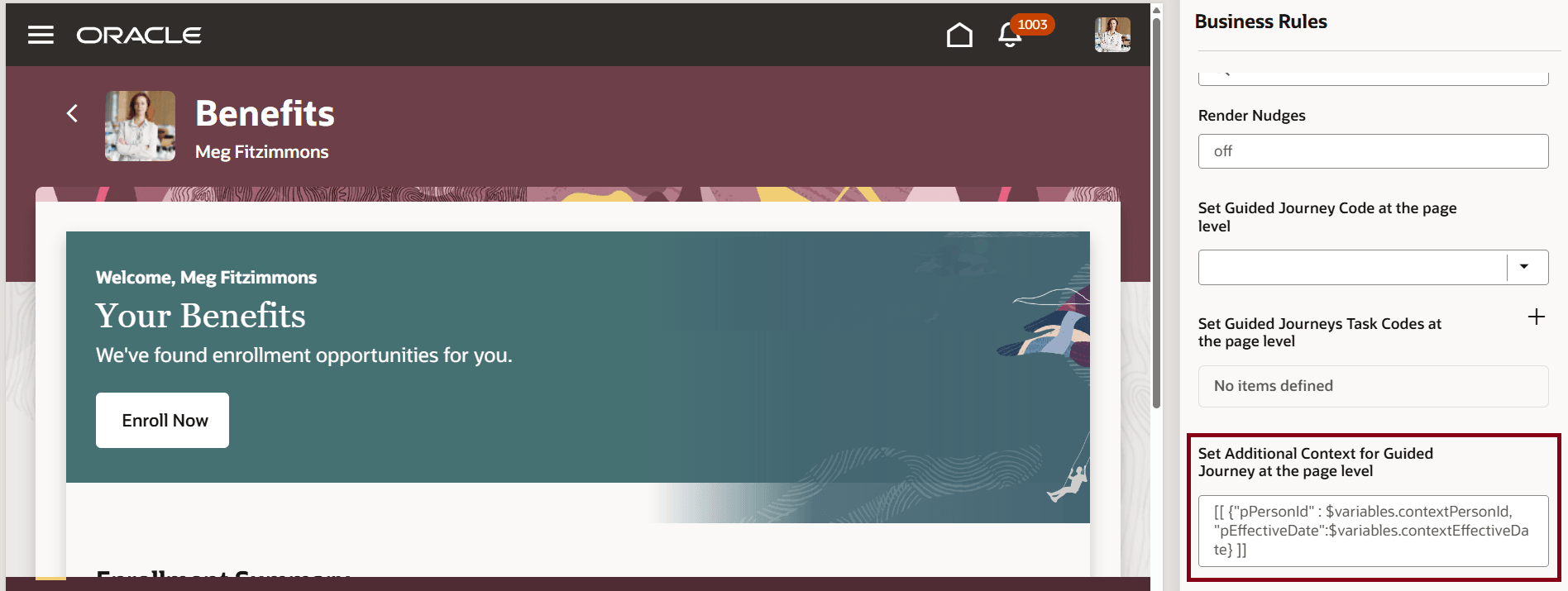Redwood Additional Context Feature to Support BI Reports in Guided Journeys
You can now use the additional context feature to easily bring Business Intelligence (BI) reports into guided journeys by passing parameters from Benefits pages. These pages support the additional context feature:
- Benefits Summary in Benefits Activity Center
- Self-service landing page
- Self-service View All Enrollments

Set Additional Context for Guided Journey at the page level Property
Administrators and employees can use these reports to access important information that isn't directly available on the page. This feature supports better decision-making and greater efficiency, because users can view comprehensive data within their primary Redwood workspace without the need to navigate elsewhere.
Steps to Enable
You need to configure security to use this feature. See the Access Requirements section.
Guided Journeys Configuration Using Page Properties
How You Configure the Report Task Type in Journeys
Administering Analytics and Reports for HCM
Tips And Considerations
When the page is opened in Visual Builder Studio, you can use the Set Additional Context for Guided Journey at the page level property to pass parameters. This property controls the additional context for the display of the guided journey at the page level.
These are the default parameters in the additional context variable:
- Person identifier (pPersonId)
- Effective date (pEffective date). The date values should be in the MM-DD-YYYY format.
You can include other parameters also. Note that the parameters should be of type string. Here’s an example of the additional context variable with an additional parameter named pSecureMode:
[[ {"pPersonId": $flow.variables.pPersonId,
"pEffectiveDate":$flow.variables.pEffectiveDate,
"pSecureMode":"EMP"
} ]]
Key Resources
Implementing and Using Journeys
Control Display of Guided Journey Based on User Roles
Access Requirements
Roles you need to add context to a guided journey:
- Human Capital Management Application Administrator
- Application Implementation Consultant
If you have custom roles, ensure that the respective privileges and aggregate privileges of the functional modules are part of your role hierarchy.
After adding the privileges and aggregate privileges, regenerate the data role and verify the user interfaces.
To use Visual Builder Studio, ensure that your user account is linked to this job role:
- Application Implementation Consultant (ORA_ASM_APPLICATION_IMPLEMENTATION_CONSULTANT_JOB)
As an administrator, you must have certain privileges to assign the necessary roles:
-
- These privileges are required for everyone who assigns Oracle Cloud Applications roles to their users:
- Cloud administrator
- Service administrator
- Application administrator
- In Oracle Identity Cloud Service (IDCS), you must have either an Identity Domain Administrator or User Administrator role. You only need these roles if IDCS role synchronization has been turned off and you need to assign the VB Studio IDCS roles manually.
- These privileges are required for everyone who assigns Oracle Cloud Applications roles to their users:
This table shows the mapping between the VB Studio IDCS roles and the Oracle Cloud Application roles:
| Oracle Cloud Application Role | VB Studio IDCS Role |
|---|---|
|
VB Studio administrator (DEVELOPER_ADMINISTRATOR) |
|
VB Studio user (DEVELOPER_USER) |